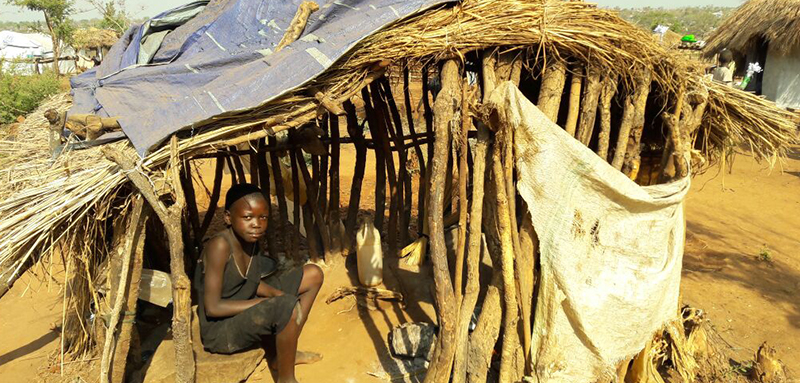World Day of migrants and refugees: Interview with Fr. Naduviledathu Francis Joseph, SVD
"Today, South Sudanese refugees in Uganda exceed one million. They are houses in different refugee settlements. Most of the refugees are still in shock. They still remember horrible scenarios they have experienced: they speak of barbaric violence, with armed groups reportedly burning down houses with civilians inside, relatives being killed in front of family members, sexual assaults of women, and kidnapping of boys for forced recruitment."
What is the situation for Sudanese who lived in Uganda?
Fr. Francis: Today, South Sudanese refugees in Uganda exceed one million. They are houses in different refugee settlements. Most of the refugees are still in shock. They still remember horrible scenarios they have experienced: they speak of barbaric violence, with armed groups reportedly burning down houses with civilians inside, relatives being killed in front of family members, sexual assaults of women, and kidnapping of boys for forced recruitment.
Presently the Divine Word Missionaries (SVDs) are working in the Bidibidi refugee settlement, in the Yumbe district of the West Nile Region of Uganda which is considered the largest refugee settlement in the world according to the United Nations High Commissioner for Refugees report (UNHCR). The total number of refugees in this settlement alone count for more than 272,000. Bidibidi settlement is divided into five zones and each Zone is sub divided into villages for easy administration. Refugees have the freedom to go anywhere they want and do whatever occupation one likes to do because of that it is not known as a refugee camp rather it is called settlements. People are not put together according to clans or tribes. Most of the refugees who are in the Bidibidi settlement are from the Central Equatorial Region of South Sudan, who speaks different tribal languages. Many of these refugees are from the Catholic Diocese of Yei and Holy Family Parish in Lainya was part of Yei diocese.
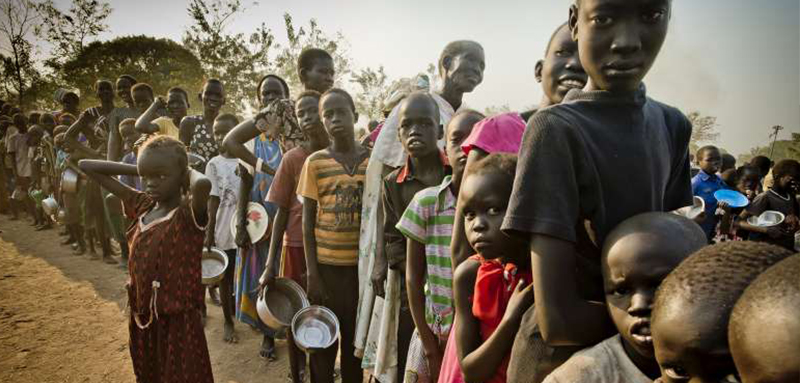
Can you describe the life of the refugees within the sttlements
Fr. Francis: I visited the settlements in the middle of October’16 I could only see miles and miles of huts made of tarpaulin sheets provided by the UNHCR. Every household is provided with a land area of 30m x 30m and this is meant for ones house, toilet, bath area and a small garden. Under the UNHCR a number of NGOs are operating. The Prime Minister’s Office is the one distributing the NGOs to various settlements. There are a number of child friendly areas for the children to play in many of the villages under each of the settlements. So, also there are schools, health centres, food distribution centres, problem solving centres, etc. Today, the refugees are more or settled down. Most of them have constructed semi-permanent huts using unburnt bricks for walls and grass for roofs which are much cooler. As we are in the Christmas Season everyone in the Settlements are preparing himself or herself for the Christmas celebrations.
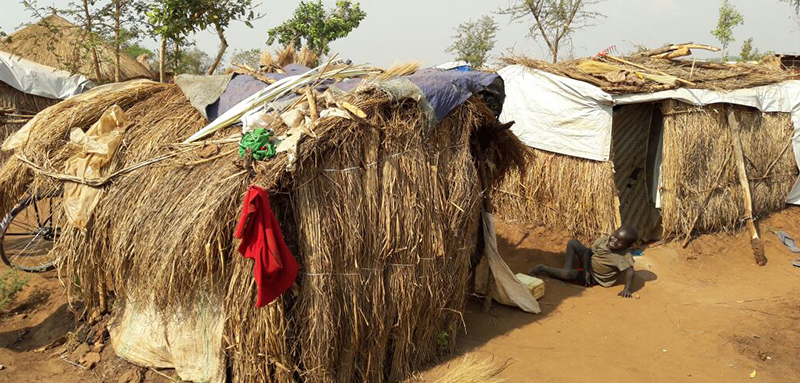
Do local people welcome them?
Fr. Francis: immediate answer is “Yes”. But of course, always all kinds of strings are attached to the locals welcoming the refugees. Binging of refugees has greatly helped the local population. Before the refugees were brought to Yumbe, nobody knew there existed a place called Yumbe. Today because of the refugee population business is thriving in Yumbe. Job opportunities are given to the host communities. The local population also enjoy some of the amenities that are provided for the refugees.
“Welcoming, protecting, promoting and integrating migrants and refugees” (Message of His Holiness Pope Francis for the 104th World Day of migrants and refugees 2018)
Is there any hope for those people going back home one day?
Fr. Francis: the present given situation, I don’t think they will be able to go back home in the immediate future. At the moment 90% of the settlers are women and children. Most of the men are still in South Sudan. Many of them told me that they will have two homes once peace returns to South Sudan; one here in Uganda and the other one in South Sudan.
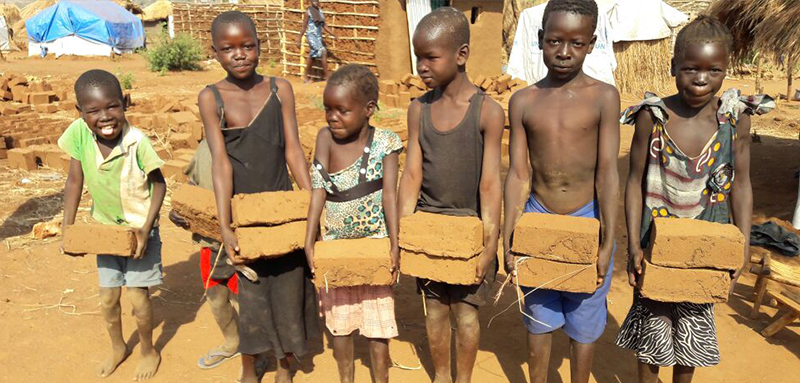
Do they receive help of the World Organizations? Which kind of help.
Fr. Francis: UNHR provides the refugees with almost everything; food, water, medical aid, educational facilities, widows and widowers are provided with some amount of cash every month, etc. Different NGOs also provide the people with distribution of seeds, farming tools, skills training, trauma healing etc.
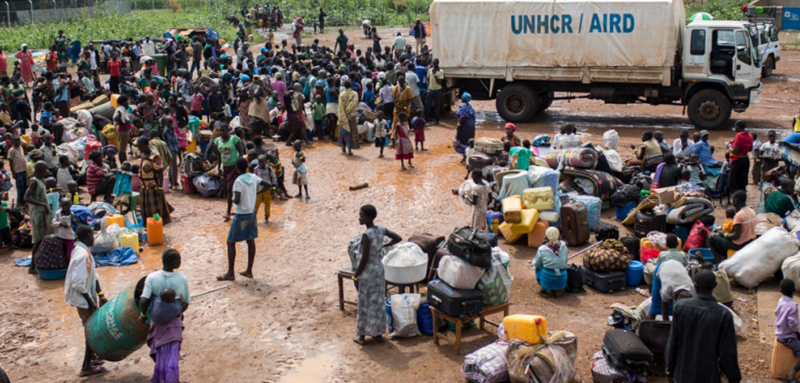
How many Divine Word Missionaries are working with those refugees? Can you describe your work in the camp?
Fr. Francis: At the moment we are just two of us; Bro. Vinsentius Knaofmone and Fr. Naduviledath Francis Joseph. Since the end of November’16 I am working in the settlements. Brother Vinsentius joined me in the middle of March’17. A third confrere came to join us in our work in the settlements on 14th June’17. However, on 15th June’17 he was involved in a motor accident and after that he is still recuperating in his home country.
As I said in the beginning, Bidibidi refugee settlement is the largest refugee settlement in the world. It is divided into five Zones and the five zones are subdivided into a number of villages. There are 29 chapels all together in the Bidibidi refugee settlements and I am the only priest ministering in these 29 chapels. My involvements in the settlements are purely pastoral. I celebrate various sacraments for them and with them, visit their huts, talk to them, give counselling and guidance, etc. Also, with the help I receive from the Society as well as from some of my benefactors we do organize workshops and seminars for different groups in the settlements. Bro. Vinsentius Knaofmone is in charge of the various youth groups in the settlement. Through the help of some of our benefactors we are able to send a number of Senior Secondary Schools students outside the settlements for better education and formation. Though there are a number of health facilities in the settlements most of the time these health facilities are not equipped with medicines and we do come to the aid of some of these helpless people.
Did this work change you as a person, and what has it given you?
Fr. Francis: First and foremost, working among these ‘God forgotten or God forsaken’ and helpless people has made me to be more compassionate and more loving towards them. I feel for them and I sympathize with them and try to do the best I can for them in the given situation. Listening to their struggles and concerns makes me to be more patient with people and tolerant towards other people. There are people in the settlements that were reasonably rich and had everything in South Sudan and today there is no difference between him and his immediate neighbour in the settlement that hardly had anything in South Sudan. They all have to ‘Q’ up for their monthly rations and supplies provided by different agencies and NGOs under the UNHCR. In short, working among and for these refugees has made me to be a better human person.
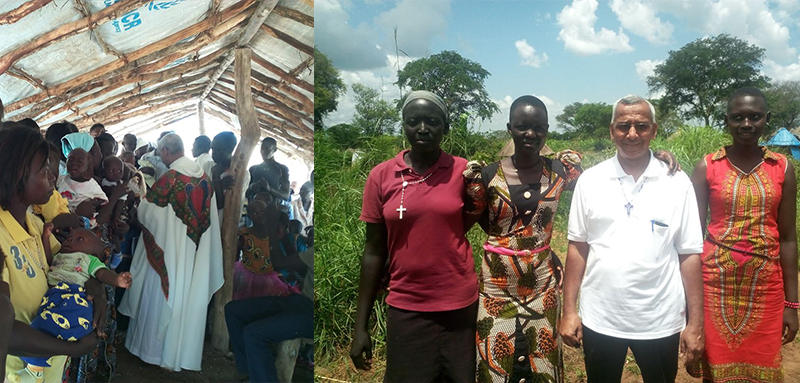
Fr. Francis, missionary in South Sudan since 2012. Today, you find yourself in Uganda.
Fr. Francis: It is true that I had been one of the Pioneering Missionaries to South Sudan Mission (SSD Mission) from 2012. However, today I find myself working among the South Sudan refugees who are in the various Refugee Settlements under the Bidibidi refugee settlement in the Yumbe District of the West Nile Region of Uganda. How? In order to answer this question, I have to take you back to South Sudanese history a bit. South Sudan gained her independence from the Sudan on 9th July 2011. On 15th December 2013, the first conflict broke out in the capital, Juba in the newly independent country, between the armies of the President, who is from the Dinka tribe and the Vice President who was from the Nuer tribe and a lot civilians as well as soldiers from both the sides were killed.
Ever since, there had been a lot of uprising in various parts of the country between these two tribes and other tribes joining the Nuer soldiers to fight the Dinka soldiers. On 8th July’16, a day before the Independence Day celebrations, once again conflicts started between these two fractions in the capital Juba and within a few days spread to other parts of the country. Holy Family Parish in Lainya which falls under the Yei River State comes under the Central Equatorial Region was considered to be one of the most peaceful places to live-in, in South Sudan. However, even before the troubles that started on 8th July’16 in the Capital, Juba, there were already signs of fear and insecurity in Yei town and the surrounding communities. One of the signs was the shooting incident of our late doctor Sr. Veronica Rackova SSpS who was driving an ambulance back home after sending a difficult delivery case to a better equipped health facility, in the night of May’16 and she died in a Nairobi hospital in Kenya on 20th May’16. Even today the killing of Rev. Dr. Sr. Veronika SSpS remains a mystery.
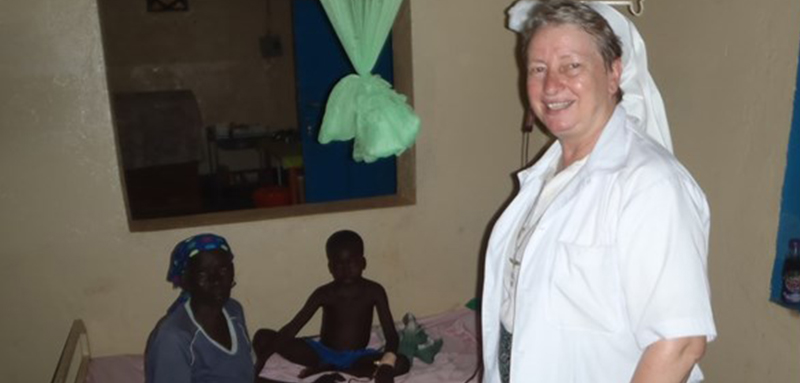
People in Lainya, where the Divine Word Missionaries (SVDs) had their base under the Catholic Diocese of Yei, as soon as they heard of the disturbances in Juba on 8th July’16, fearing brutalities from the government soldiers or called the Sudan People’s Liberation Army (SPLA) left their homes with all the possessions they could take along with them and came to the mission compound. Most of their personal possessions they left in our newly constructed Youth Centre believing their possessions would be safe under our custody. Many of them spent almost a week with us and then left for the bush and gradually crossed over to Uganda.
We as an SVD Community had decided to stay on in our compound as long as it was possible for us to stay in Lainya. However, on 22nd July’16 the presence of so many soldiers belonging to some militia group with heavy weapons around our Tukuls (huts) in which we lived in and killing one of the Ugandan nationals and wounding seriously another person who had taken refuge in our youth centre made us to look for ways and means to get out of this difficult and dangerous situation. Since all the roads leading out to Juba the capital as well as to Yei, the State capital from Lainya was blocked either by the government soldiers or by the rebels, we had no way to get out. However, on 29th July’16 with the help of God and help from the government of Yei State we were evacuated out of Lainya to Yei and from there we flew to Juba, the capital and from there to Nairobi, Kenya. Our confreres in Nairobi, Kenya received us very well and made us to feel at home. After resting and recuperating for a few days in Kenya we were given the necessary permission by Fr. Superior General to spend some time with our dear and loved ones at home.
Before leaving Nairobi, Kenya for our homes we had made our intentions to go back to South Sudan as soon the situation became normal. If the situation was going to take more time to be normalized then two of our confreres from Poland had wanted to study the Classical Arabic language in Cairo, Egypt and that is what they are doing at the moment. One of our confreres from Indonesia wanted to improve upon his English language and that is what he is doing at the moment. Bro. Vinsentius Knaofmone SVD had been a missionary to Paraguay and Fr. Naduviledath Francis Joseph SVD, a missionary to Ghana, before opting to go to South Sudan and therefore they were ready to go back to their former mission countries.
As I was preparing to go back to Ghana in September’16 I received a call from Fr. Heinz Kuluke, the Superior General of the SVD requesting me whether I would be ready to be the leader of a team that would visit the refugee settlements in Uganda and see the possibility of SVDs venturing into Uganda to work among the South Sudanese refugees in Uganda. This idea was given to Fr. General by His Excellency, Most Rev. Michael August Blume SVD the Apostolic Nuncio to Uganda. In the middle of October’16 Fr. Joseph Kallanchira SVD, the AFRAM Zonal coordinator and Fr. Naduviledath Francis Joseph, the Mission Superior of the SSD Mission visited the various refugee settlements in Uganda in the company of the Apostolic Nuncio, Msgr. Michael Blume SVD and met with the host bishop of Arua diocese, Msgr. Sabino Ocan Odoki and at the end of the one week visit presented our report to Fr. Superior General. Our report to Fr. General was very positive and immediately I was asked whether I would be ready and willing to work among the South Sudanese refugees who are in the various refugee settlements in Uganda and my response was also very positive. Two weeks later on 22nd November’16 I was already in Kampala, the capital of Uganda.
By Modeste Munimi, SVD.









